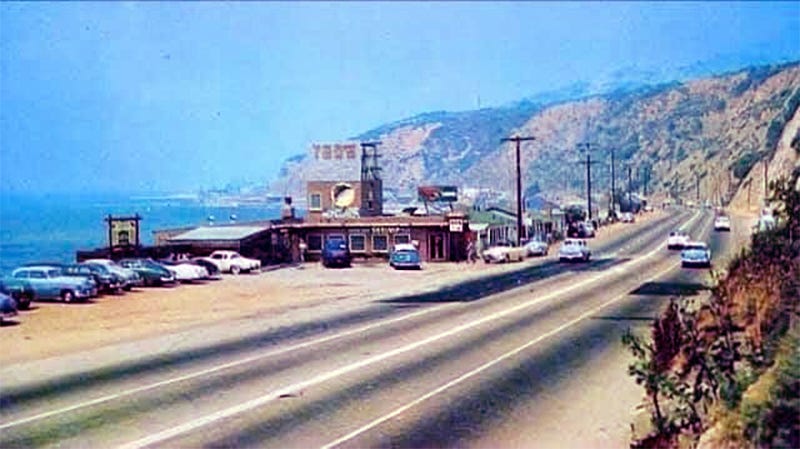It was inevitable that I would come to work at Ted’s Rancho Restaurant, as it was the only employer within miles of where I lived with my parents in the no-man’s-land that was Sunset Mesa, between the feet of Topanga Canyon Blvd. to the north and Sunset Blvd. to the south, and up the hill. I had gone into Pacific Palisades (famous for having burned down a few weeks before I wrote this) offering my services, and been rebuffed and rebuffed and rebuffed.
According to the pencil-mustached, waitress-groping sleaze who managed Ted's — “Lucky” Fields (nê Feldman), I wasn’t being considered as a bus boy, but as nothing less than a Junior Waiter. Whatever the job, I wasn’t impressive at my audition. Lucky asked me to pour him a cup of coffee. I faced him across the narrow table as I did so. He rolled his eyes and pointed out that hot beverages were correctly poured from the side, to minimize the danger of the diner being scalded in the event that an earthquake or comparable mishap made the junior waiter lurch forward. I nonetheless got the job.
I wasn’t good at it. I didn’t like having to carry heavy, greasy tubfuls of dirty dishes and cutlery into the kitchen, there, invariably, to be shrieked at by the half-mad Negro dwarf dishwasher, Old Joe, who was extremely fussy about where the tubs should be placed. It took me a couple of weeks to realize that there was no right place, and that the poor devil just enjoyed screaming at little white boys from ‘way up on the hill.
The most expensive thing on the menu, at $13, was chateaubriand. Whenever someone ordered it — maybe a couple of times a month — we employees would be dumbstruck by the knowledge that there was among us a person of nearly unimaginable wealth. As a junior waiter, I was notionally entitled to 15 percent of the tips of the waitresses’ whose stations I serviced. The waitresses were uniformly awful at math. On a good night, when they’d made $15 ($152.71 in 2025 money, mind you). they would give me one dollar.
I lusted after most of the cocktail waitresses, whom Lucky hired, enjoyed carnally, and dismissed just slightly less often than I got screamed at by Old Joe. None, of course, had the slightest inkling that I who, at sixteen, managed to go out on a date yet, was alive. The bartender Axel, a pockmarked Eastern European, referred to me in his siniser accent as “the college boy” even though I had another year of Santa Monica High School to complete, I don’t think I walked through his domain once without him sneering at me.
He was Mr. Cordiality 1964 compared to the Adolf Eichmann lookalike who became head chef shortly after my hiring. I guess I must have been looking ultra-Jewish, or at least ethnic, at the time, decades before I began to fade. But the discomfort the sight of me caused Chef Bill was nothing compared to that he experienced when Lucky promoted the earnest, palpably conscientious Collins Hall, formerly a dishwasher, to sous chef.
I’m pretty sure Collins was the first black person I’d ever actually spoken to. (There were a few black kids at Samohi, but they were scrupulously herded into deadenders’ classes, rather than the college prep ones in which I learned so very, very much.) Once having come to feel that we’d bonded, I, imagining myself noble, informed Collikn that I didn’t hate him for the color of his skin. He took a long moment to respond. “Why, thank you, suh.” Not until years later did it dawn on me that he was being sarcastic.
Ted’s was open until two in the morning on Fridays and Sundays, and I’d be refilling salt and papper shakers and swabbing the deck of the outside seating area, under which the tide came, until the bitter end. That summer, Mary Wells and “Hello Dolly” ruled the jukebox, but it was Willie Nelson’s four-year-old :NIghtlife” that resonated most for me. “Yes,” I would think to myself drama-queenishly as I swabbed, “the nightlife ain’t no good life, but it is indeed my life.”
After I surrendered my junior waiter’s red jacket for a parking attendant’s red jacket (actually, the same garment), I had the pleasure and privilege of parking the Cadillac convertible in which the famous singer Johnny Mathis and five handsome young men in velour turtlenecks arrived one Sunday afternoon. I didn’t ask for his autograph, though as a 10-year-old I’d adored “Wonderful Wonderful”.







Many of us have had crappy jobs. Don't laugh, but I was (briefly) a "tin man" (someone who sold aluminum siding). Years later, in my late 30s (and post doctorate), I was a temporary typist earning $6.50/hour, 20 hours per week. Fortunately, those days are behind me...